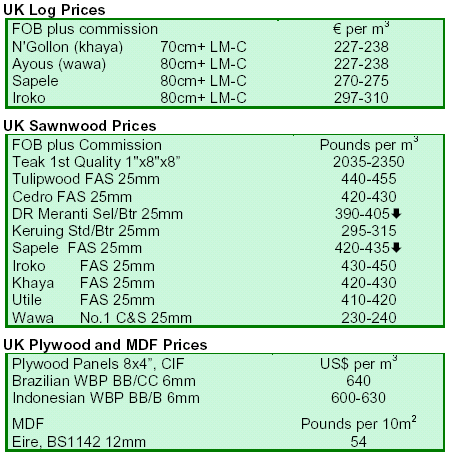|
Report
from the UK
Homebase sales drop slightly in first half
After sales climbed slightly in the first quarter of Homebase¡¯s business year 2007-08, second quarter
sales dropped 6.2%. As a result, the DIY chain¡¯s sales fell slightly by 0.3% to GBP854 million in the
first half of its business year. The company attributed the second quarter
drop to poor weather conditions, resulting in a 20% fall in seasonal sales.
Additional homes will not avert housing crisis in England
Despite moves to build an additional three million homes in England by 2020, the housing crisis in the
UK would not be averted, said the BBC. Experts advising ministers on the housing situation said that at least another 250,000
houses would be needed to address the shortfall. In other news, the Royal Institute of Chartered Surveyors said that
housing prices would continue their downturn. The Institute¡¯s September survey showed housing prices
generally lower, due to higher interest rates and lenders tightening their lending criteria.

EUROPE
MARKET and Scandinavia
UNECE Timber Market Committee concludes annual
market discussions
The UNECE Timber Market Committee conducted its annual market discussions for the first time in
conjunction with the International Softwood Conference in Geneva, Switzerland, earlier this month. It
was followed by a policy forum on bioenergy policies and targets. Wood energy use was high on the
agenda, drawing attention to the challenges facing the European and global wood
products sector to promote the use of renewable energy sources.
A key paper presented by Udo Mantau of the University of Hamburg used the European Forest Sector
Outlook Studies¡¯ projections of European wood supply to show that the current European policy targets for renewable
energy would not be met. Mantau explained that an increase in wood supply was needed
from existing or new sources or through imports, otherwise the policy targets
could not be met using wood. It was noted that considerable wood resources were available from other
unrecorded sources and that considerable empirical research was required to analyze the potential wood
supply from other sources. Much discussion also focused on ¡®green building¡¯ requirements. Markets were already
being influenced by requirements for green buildings.
The market discussion on public procurement policies was of particular interest to tropical producers.
Public agencies or private firms (such as large publishing groups, building
supplies wholesalers and DIY outlets) were adding criteria other than price and performance to the decision making
process. Many purchasers were insisting that forest products must come from sustainable, or at least legal,
sources and that this be verifiable in order to maintain credibility with public opinion. In the UK, for example,
the government announced that from April 2009, its central departments would purchase only timber and
timber products derived from sustainably managed forests or licensed under FLEGT agreements.
The market discussions also noted that the US housing market¡¯s downturn could affect the global
economy and wood products consumption. Additionally, participants said the change in Russian forest sector policies were an
issue of concern for importers of Russian roundwood and other market actors.
Russia had imposed duties on export logs, scheduled to reach prohibitive levels by 2009.
Precious Woods profit rises
EUWID reported that Precious Woods¡¯ revenue continued to rise from January ¨C June 2007, up 77% to USD37.6
million from the previous period in 2006. The jump in revenue was a result of sales revenue of two Gabon-based
companies acquired by Precious Woods in April 2007, which together accounted for revenues of USD13.2
million. While turnover in Precious Woods¡¯ Brazilianbased subsidiaries in the
Amazon and Para was lower than expected, Precious Woods continued to adhere to their
profit expectations for the year 2007.
Swedish softwood exports fall in July 2007
The Swedish Forest Industries Federation reported that Swedish exports of sawn and planed softwood lumber
dropped 16.4% to 0.738 million m3 in July 2007, compared to June 2006. EUWID reported that from
January ¨C June 2007, foreign shipments also fell 9.9%. Shipments to Asia alone dropped 13.3% in volume to
0.703 million m3, while exports to Africa declined 1.9% in volume to 0.682 million m3.
Shipments to other Scandinavian and European countries also fell, while export prices rose during the
period under review.
FEFC sets higher freight rates from Europe to Asia
EUWID reported on the recent rise in ocean tariffs, which were set by the London-based Far East
Freight Conference (FEFC). The FEFC said that from 1 October 2007, timber shipped in 40-foot
containers from the North Sea to major Asian ports would cost a base rate of USD250 and could
reach up to USD350 for shipments to Japan. Uniform tariffs were previously not in effect for FEFC members,
and as a result, the average cost of shipments for 40-foot containers was about USD300-350. However, under the
new system, once additional surcharges are added, shipping costs in some cases could
increase by USD700 per container.
The price rise has since affected Asian buyers¡¯ purchasing habits. Since the new tariffs were
introduced, some Asian buyers have cancelled orders for hardwood lumber from
Central Europe. German hardwood sawmills have also been affected by the downturn in business from Asia, and
experts fear that Asian buyers will seek alternatives if the freight rates remain high and lumber prices increase.
Quality problems lead to declining interest in Chinese plywood in EU
Importers in the EU have lessened their interest in Chinese plywood, in part due to quality problems that have been
encountered with Chinese manufacturers, said EUWID. A number of importers have been
complaining that the core of certain low and medium grades were problematic,
unable to withstand stress tests and meet thickness tolerances. Additionally, there is also uncertainty
regarding political decisions surrounding EU anti-dumping duties on Chinese plywood and the still uncertain but
expected abolition of value-added tax rebates on Chinese plywood exports (see TTM 12:16 and 12:19).
|